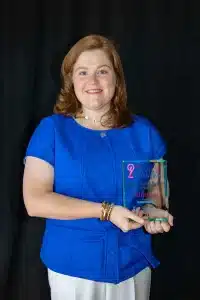NP Strategy is thrilled to announce that Senior Strategic Advisor Jean Cecil Frick was recognized as one of Columbia Regional Business Report’s 2020 Phenoms at a virtual award ceremony on August 5.

Frick is among 14 “hard-charging game-changers,” selected as members of the business outlet’s second class of Icons and Phenoms.
“Jean Cecil has been a phenom in our office since day one,” NP Strategy CEO Heather Hoopes Matthews said. “Her positive attitude and work ethic is infectious, inspiring those around her.”
“I’ve been blessed to call Columbia home for the past eight years,” Frick said. “While being recognized as a phenom is an honor, I’m most grateful for the colleagues and friends that support me and that I learn from daily.”
The business report honored a pair of groups who are making an impact on the area business scene: Icons, the respected pillars who have established standards of business and civic excellence; and Phenoms, the motivated go-getters who are getting things done in new and exciting ways.
This year’s honorees spanned a wide range of industries, from construction pioneers to city leaders to nonprofit champions. Award recipients were nominated by Business Report readers and selected by a panel of judges.
